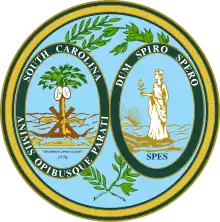1992 United States House of Representatives elections in South Carolina
The 1992 United States House of Representatives elections in South Carolina were held on November 6, 1992, to elect the six U.S. representatives from the state of South Carolina, one from each of the state's six congressional districts. The elections coincided with the 1992 U.S. presidential election, as well as other elections to the House of Representatives, elections to the United States Senate and various state and local elections.
| ||||||||||||||||||||||
All 6 South Carolina seats to the United States House of Representatives | ||||||||||||||||||||||
|---|---|---|---|---|---|---|---|---|---|---|---|---|---|---|---|---|---|---|---|---|---|---|
| ||||||||||||||||||||||
 
| ||||||||||||||||||||||
| Elections in South Carolina |
|---|
 |
Primary elections were held on June 9. In the general election, four incumbents were re-elected; however, incumbent Democrat Liz J. Patterson of the 4th district was defeated in her bid for a fourth term by Republican challenger Bob Inglis. Additionally, control of the open 6th district seat was retained by Democratic newcomer Jim Clyburn following the retirement of five-term incumbent Robin Tallon after the district's racial composition was significantly altered in redistricting. As of 2023, this is the last time South Carolina's congressional delegation comprised an equal number of Republicans and Democrats, and the last time Democrats would receive over 40% of the vote in U.S. House elections in the state until 2006.
Redistricting
Following the 1990 United States census and subsequent redistricting cycle, South Carolina's congressional districts were redrawn by a federal court after the state legislature failed to produce their own map.[1] The court's plan, which was issued on May 1, 1992,[2] shifted the boundaries of each of the state's six congressional districts substantially; in the 1980s, South Carolina's districts were largely made up of whole counties, with only one (Berkeley County) being split between two districts. In contrast, the court-drawn lines split a total of 13 counties, 11 of which were divided and dispersed to create the new 1st, 2nd, 5th, and 6th districts. This splitting of counties was done largely to shift the 6th district, then-consisting of a predominantly white electorate, into a majority-minority seat that would allow the state's large black population to elect an African-American to Congress.[1]
Overview
| District | Republican | Democratic | Others | Total | Result[3] | ||||
|---|---|---|---|---|---|---|---|---|---|
| Votes | % | Votes | % | Votes | % | Votes | % | ||
| District 1 | 121,938 | 66.07% | 59,908 | 32.46% | 2,703 | 1.46% | 184,549 | 100.0% | Republican Hold |
| District 2 | 148,667 | 87.62% | 0 | 0.00% | 21,003 | 12.38% | 169,670 | 100.0% | Republican Hold |
| District 3 | 75,660 | 38.83% | 119,119 | 61.13% | 85 | 0.04% | 194,864 | 100.0% | Democratic Hold |
| District 4 | 99,879 | 50.34% | 94,182 | 47.47% | 4,349 | 2.19% | 198,410 | 100.0% | Republican Gain |
| District 5 | 70,866 | 38.71% | 112,031 | 61.19% | 189 | 0.10% | 183,086 | 100.0% | Democratic Hold |
| District 6 | 64,149 | 34.70% | 120,647 | 65.26% | 75 | 0.04% | 184,871 | 100.0% | Democratic Hold |
| Total | 581,159 | 52.10% | 505,887 | 45.35% | 28,404 | 2.55% | 1,115,450 | 100.0% | |
District 1
| |||||||||||||||||
| |||||||||||||||||
The 1st district stretches from the coastal regions of the Pee Dee into the upper parts of the Lowcountry, including all of Georgetown and Horry counties, and taking in a sizable portion of Berkeley County; due to redistricting, the 1st lost a significant amount of its share of Charleston and Dorchester counties, in addition to all of Beaufort, Colleton, Hampton, and Jasper counties.[1] The incumbent was Republican Arthur Ravenel Jr., who was re-elected with 65.5% of the vote in 1990.
Nominee
- Arthur Ravenel Jr., incumbent U.S. representative[3]
Nominee
Fundraising
| Campaign finance reports as of December 31, 1992 | |||
|---|---|---|---|
| Candidate (party) | Total receipts | Total disbursements | Cash on hand |
| Arthur Ravenel Jr. (R) | $282,816 | $561,793 | $0 |
| Bill Oberst Jr. (D) | $56,972 | $56,902 | $69 |
| Source: Federal Election Commission[4] | |||
Results
| Party | Candidate | Votes | % | |
|---|---|---|---|---|
| Republican | Arthur Ravenel Jr. (incumbent) | 121,938 | 66.07 | |
| Democratic | Bill Oberst Jr. | 59,908 | 32.46 | |
| American | John R. Peeples | 2,608 | 1.41 | |
| Write-in | 95 | 0.05 | ||
| Total votes | 184,549 | 100.0 | ||
| Republican hold | ||||
District 2
| |||||||||||||||||
| |||||||||||||||||
The 2nd district extends from the Midlands down to the Lowcountry, taking in all of Allendale, Barnwell, Hampton, Jasper, and Lexington counties, as well as parts of Aiken, Beaufort, Calhoun, Colleton, Orangeburg, and Richland counties; redistricting shifted the 2nd from a Midlands-centric seat into one which stretches along South Carolina's border with Georgia and includes a relatively large portion of the state's coastline.[1] The incumbent was Republican Floyd Spence, who was re-elected with 88.9% of the vote in 1990.
Nominee
- Floyd Spence, incumbent U.S. representative[3]
Fundraising
| Campaign finance reports as of December 31, 1992 | |||
|---|---|---|---|
| Candidate (party) | Total receipts | Total disbursements | Cash on hand |
| Floyd Spence (R) | $169,036 | $179,539 | $51,688 |
| Geb Sommer (L) | $0 | $0 | $0 |
| Source: Federal Election Commission[5] | |||
Results
| Party | Candidate | Votes | % | |
|---|---|---|---|---|
| Republican | Floyd Spence (incumbent) | 148,667 | 87.62 | |
| Libertarian | Geb Sommer | 20,816 | 12.27 | |
| Write-in | 187 | 0.11 | ||
| Total votes | 169,670 | 100.0 | ||
| Republican hold | ||||
District 3
| |||||||||||||||||
| |||||||||||||||||
The 3rd district is based in both the Upstate and the Midlands, encompassing all of Abbeville, Anderson, Edgefield, Greenwood, McCormick, Oconee, Pickens, and Saluda counties, and parts of Aiken and Laurens counties; following redistricting, the 3rd became much more Upstate-oriented as it lost Allendale and Barnwell counties, as well as some of Aiken county, while gaining most of Laurens county.[1] The incumbent was Democrat Butler Derrick, who was re-elected with 62.1% of the vote of in 1990.
Nominee
- Butler Derrick, incumbent U.S. representative[6]
Nominee
- Jim Bland[6]
Fundraising
| Campaign finance reports as of December 31, 1992 | |||
|---|---|---|---|
| Candidate (party) | Total receipts | Total disbursements | Cash on hand |
| Butler Derrick (D) | $681,632 | $673,677 | $114,145 |
| Jim Bland (R) | $17,536 | $17,339 | $194 |
| Source: Federal Election Commission[7] | |||
Results
| Party | Candidate | Votes | % | |
|---|---|---|---|---|
| Democratic | Butler Derrick (incumbent) | 119,119 | 61.13 | |
| Republican | Jim Bland | 75,660 | 38.83 | |
| Write-in | 85 | 0.04 | ||
| Total votes | 194,864 | 100.0 | ||
| Democratic hold | ||||
District 4
Incumbent Democratic Congresswoman Liz J. Patterson of the 4th congressional district, in office since 1987, was defeated for re-election by Republican challenger Bob Inglis.
Republican primary
| Republican primary | ||
|---|---|---|
| Candidate | Votes | % |
| Bob Inglis | 21,301 | 70.8 |
| Bill McCuen | 4,760 | 15.8 |
| Jerry L. Fowler | 4,029 | 13.4 |
General election results
| Party | Candidate | Votes | % | ±% | |
|---|---|---|---|---|---|
| Republican | Bob Inglis | 99,879 | 50.3 | +11.9 | |
| Democratic | Liz J. Patterson (incumbent) | 94,182 | 47.5 | -13.9 | |
| Libertarian | Jo Jorgensen | 4,286 | 2.2 | +2.2 | |
| No party | Write-Ins | 63 | 0.0 | -0.2 | |
| Majority | 5,697 | 2.8 | -20.2 | ||
| Turnout | 198,410 | ||||
| Republican gain from Democratic | |||||
District 5
Incumbent Democratic Congressman John M. Spratt, Jr. of the 5th congressional district, in office since 1983, defeated Republican challenger Bill Horne.
Republican primary
| Republican primary | ||
|---|---|---|
| Candidate | Votes | % |
| Bill Horne | 7,258 | 55.4 |
| Earnest R. Archer | 5,833 | 44.6 |
General election results
| Party | Candidate | Votes | % | ±% | |
|---|---|---|---|---|---|
| Democratic | John M. Spratt, Jr. (incumbent) | 112,031 | 61.2 | -38.6 | |
| Republican | Bill Horne | 70,866 | 38.7 | +38.7 | |
| No party | Write-Ins | 189 | 0.1 | -0.1 | |
| Majority | 41,165 | 22.5 | -77.1 | ||
| Turnout | 183,086 | ||||
| Democratic hold | |||||
District 6
South Carolina's congressional districts were redrawn following the 1990 census. The Republicans joined forces with the black Democrats in the state legislature to form a black-majority district; this gave the substantial minority the chance to elect candidates they favored. It also made the other districts predominantly majority white by a greater margin, and these conservative voters had been favoring Republicans for some time.
The boundaries of the 6th congressional district were shifted from its previous northeast position in the state to the central part of the state and defined to include many black majority counties, as well as black precincts of Charleston and Columbia. Incumbent Democratic Congressman Robin Tallon opted to retire rather than run in a district that he considered unfavorable to a white candidate. Jim Clyburn won the Democratic primary and defeated Republican John Chase in the general election to succeed Tallon in office.
Democratic primary
| Democratic primary | ||
|---|---|---|
| Candidate | Votes | % |
| Jim Clyburn | 41,415 | 56.1 |
| Frank Gilbert | 11,089 | 15.0 |
| Ken Mosely | 9,494 | 12.9 |
| Herbert U. Fielding | 9,130 | 12.4 |
| John Roy Harper II | 2,680 | 3.6 |
Republican primary
| Republican primary | ||
|---|---|---|
| Candidate | Votes | % |
| John Chase | 5,507 | 57.1 |
| Delores DaCosta | 2,452 | 25.5 |
| Toney Graham, Jr. | 1,678 | 17.4 |
General election results
| Party | Candidate | Votes | % | ±% | |
|---|---|---|---|---|---|
| Democratic | Jim Clyburn | 120,647 | 65.3 | -34.3 | |
| Republican | John Chase | 64,149 | 34.7 | +34.7 | |
| No party | Write-Ins | 75 | 0.0 | -0.4 | |
| Majority | 56,498 | 30.6 | -68.6 | ||
| Turnout | 184,871 | ||||
| Democratic hold | |||||
See also
References
- Cirincion, Carmen (February 2000). "Assessing South Carolina's 1990s congressional districting". Political Geography. 19 (2): 189–211. doi:10.1016/S0962-6298(99)00047-5. Retrieved May 5, 2023.
- Webster, Gerald R. (May 1995). "Congressional Redistricting in the Southeastern U.S. in the 1990s". Southeastern Geographer. 35 (1): 1–21. doi:10.1353/sgo.1995.0006. JSTOR 44370946. S2CID 129913516. Retrieved May 5, 2023.
- South Carolina Election Commission Annual Report (PDF) (20 ed.). Columbia, South Carolina: South Carolina Election Commission. June 30, 1993. pp. 51–52, 65–66, 81–83. Retrieved May 5, 2023.
- "1992 Election United States House - South Carolina - District 01". Federal Election Commission. December 31, 1992. Retrieved May 5, 2023.
- "1992 Election United States House - South Carolina - District 02". Federal Election Commission. December 31, 1992. Retrieved May 17, 2023.
- Booth, William; Phillips, Don; Sawyer, Kathy (November 5, 1992). "The 1992 Elections: State by State: The South". The Washington Post. Retrieved May 18, 2023.
- "1992 Election United States House - South Carolina - District 03". Federal Election Commission. December 31, 1992. Retrieved May 18, 2023.



